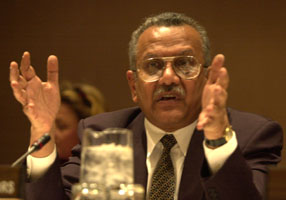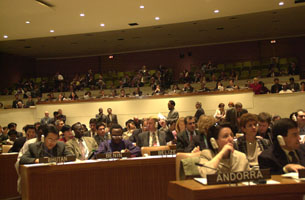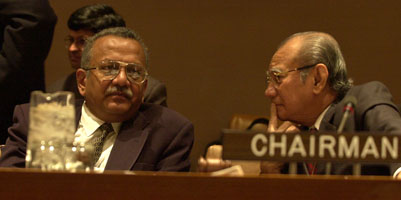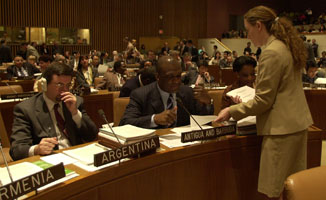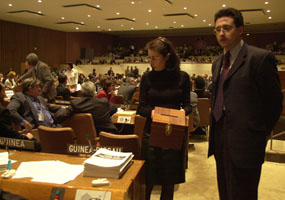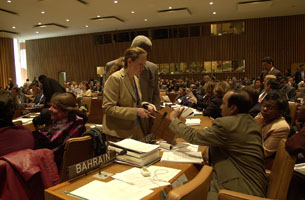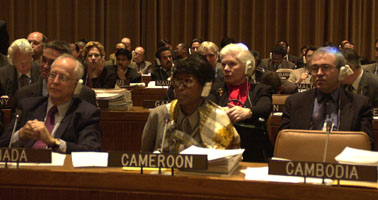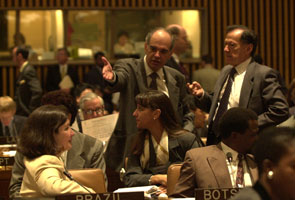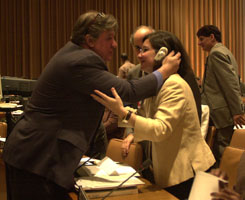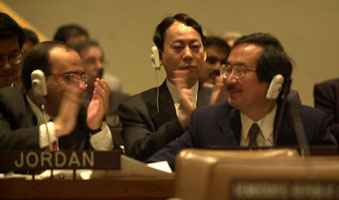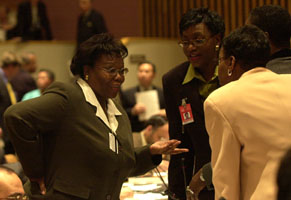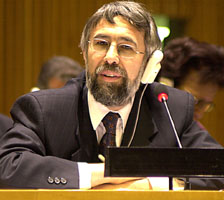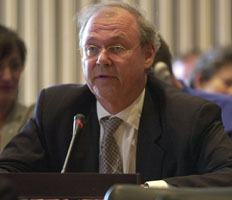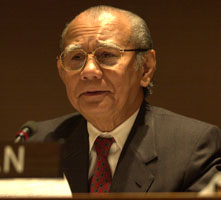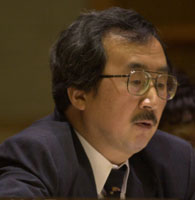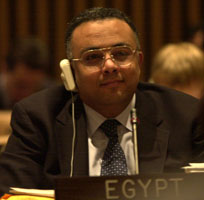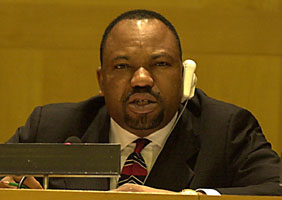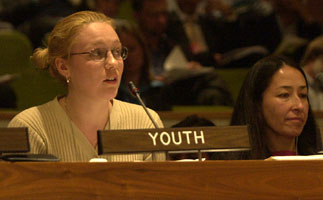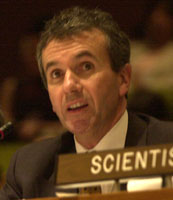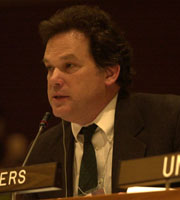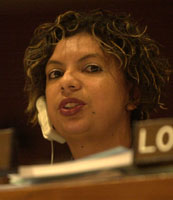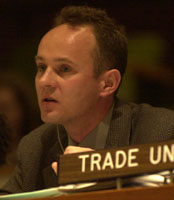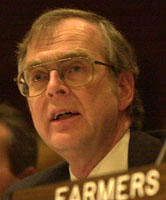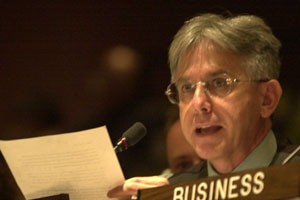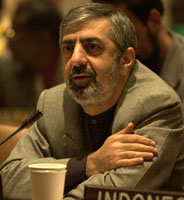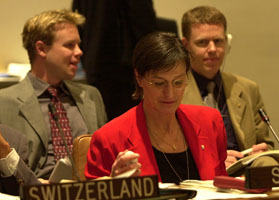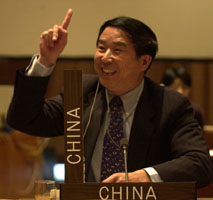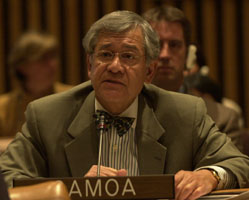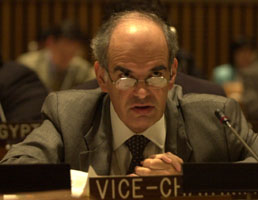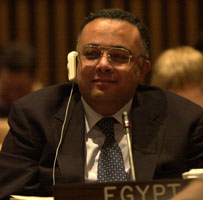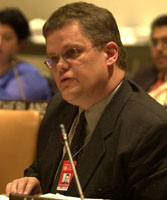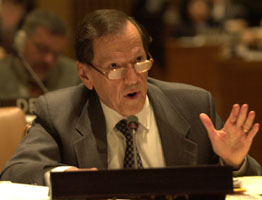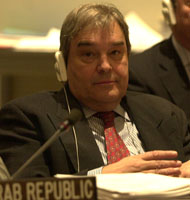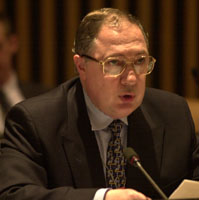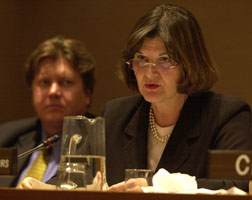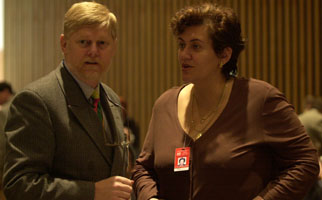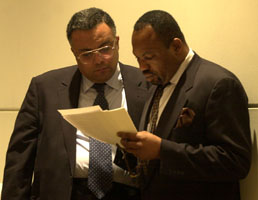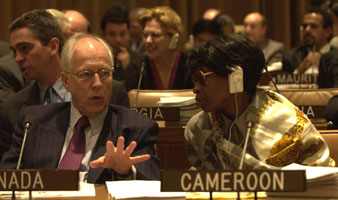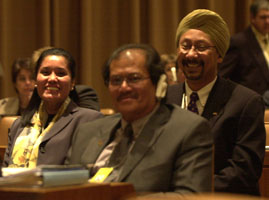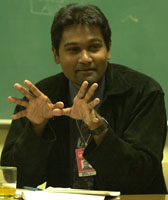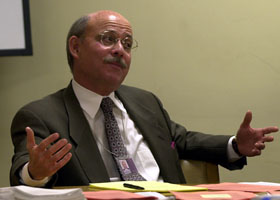 |
|
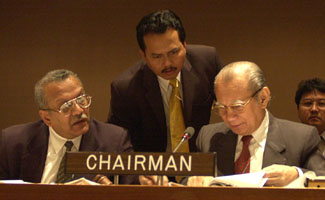 |
|
Under-Secretary-General
for Economic and Social Affaris Nitin Desai with PrepCom Chair
Elim Salim (Indonesia)
|
The
tenth session of the Commission on Sustainable Development (CSD-10),
acting as the preparatory committee (PrepCom) for the World Summit
on Sustainable Development, opened today at UN Headquarters in New
York. In the morning session, delegates elected members of the Bureau
and considered the agenda and organizational matters. They also
heard reports regarding progress toward the World Summit on Sustainable
Development and comments on the process for setting the agenda and
determining possible main themes for the Summit, which continued
during the afternoon session. The Secretariat presented the draft
rules of procedure for the Summit.
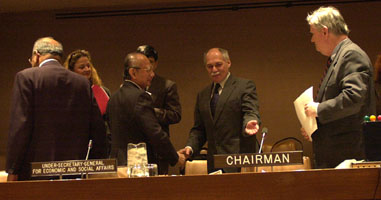 |
| Outgoing
CSD Chair Bedrich Moldan gives incoming Chair Elim Salim his
chair at the dias |
|
|
 * To view PDF files, * To view PDF files,
you will need the free Adobe Acrobat Reader:
 * To listen to Real Audio
files, you will need the free Real Audio player: * To listen to Real Audio
files, you will need the free Real Audio player:
|
 |
| JoAnne
DiSano, Director, Division for Sustainable Development, Under-Secretary-General
for Economic and Social Affaris Nitin Desai, PrepCom Chair
Elim Salim and Alexander de Barros, Secretariat |
|

In his opening statement, PrepCom
Chair Emil Salim (Indonesia) reviewed the main concerns
over sustainable development, specifically that environmental issues
are not yet mainstreamed within development. He called for the need
to chart a collaborative course for sustainable development to avoid
crashing "spaceship earth" into an environmental disaster.
|
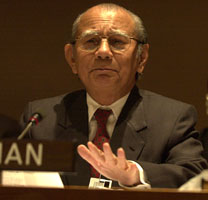
|
|
|

Introducing the Secretary-General's reports,
Under-Secretary-General
for Economic and Social Affairs Nitin Desai:
highlighted his assessment of the emerging CSD-9 that require consideration
at the Johannesburg Summit; called for a global ethic related to
sustainable development; presented the planned Summit activities;
and presented some useful resources for the Summit preparations,
including a Website and list server.
|
|
Election
of the Bureau Ahmed Ihab Gamaleldin (Egypt)
and Ositadinma Anaedu (Nigeria) for Africa; Kiyo Akasaka (Japan)
for Asia; Jan Kara (Czech Republic) and Alexandru Niculescu (Romania)
for Eastern European states; and Maria Luiza Ribeiro Viotti (Brazil)
and Diane Marie Quarless (Jamaica) for Latin America. The
region of Western Europe and other States presented four candidates
(Canada, Germany, Sweden and Switzerland) for two seats on the bureau.
Richard Ballhorn (Canada) and Mr. Lars-Göran Engfeldt (Sweden) were
elected by secret ballot.
|
Delegates
cast secret ballots in order to vote for WEOG bureau members as
there were four nominations (Canada, Germany, Sweden, and Switzerland)
for two positions. Canada (right) awaits the results of the vote.
Richard Ballhorn is on the far right.
|
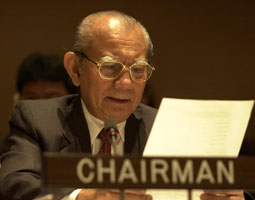 |
After
the secret ballots were collected, Chair read out the results of
the votes, and announced that Canada and Sweden would be on the
Bureau
|
| Maria
Luiza Ribeiro Viotti (Brazil) with her delegation and being congratulated
by Chile |
| Kiyo
Akasaka (Japan) and Diane Marie Quarless (Jamaica) |
|
Jan
Kara (Czech Republic), Lars-Göran Engfeldt (Sweden) and Emil Salim
(Indonesia)
|
|
Kiyo
Akasaka (Japan) and Ahmed Ihab Gamaleldin (Egypt) and Ositadinma
Anaedu (Nigeria) for Africa
|
|
Presentations
by major groups of their preparatory activities for and expected
contributions to the preparatory process
|
|
|

On behalf of the youth caucus, the United
Nations Association of Canada recommended: recognition
of the link between poverty, over consumption and the environment;
attendance by trade and finance ministers; consideration of the
unsustainable Western lifestyle; and integration of sustainability
into the education of economists and engineers.
|
 Speaking for the indigenous peoples' caucus, the International
Indian Treaty Council (above right) urged Member States
and the Secretariat to ensure broad input from Indigenous Peoples
in the preparatory sessions and highlighted the link between cultural
and biological diversity.
Speaking for the indigenous peoples' caucus, the International
Indian Treaty Council (above right) urged Member States
and the Secretariat to ensure broad input from Indigenous Peoples
in the preparatory sessions and highlighted the link between cultural
and biological diversity.
|

On behalf of business and industry, the International
Chamber of Commerce emphasized innovation, investment, integration
and implementation of policies, and called for a greater awareness
of responsibility.
|
|
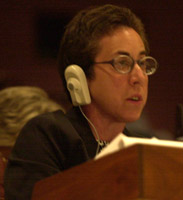 |

The Women's
Environment and Development Organization (WEDO) described
women's preliminary review activities on Agenda 21 that will culminate
with a launch in Johannesburg of a Women's Agenda for Earth Summit
2002 and urged for priority consideration to be given to crosscutting
issues and linkages and for that the location of meetings be determined
from a thematic, not stakeholder, basis. |

On behalf of farmers, the International
Federation of Agricultural Producers identified three main
issues to be the focus of the Summit agenda: food security, rural
development, and sustainable livelihoods. He also supported concentrating
on poverty reduction and the need to build capacity for participatory
development and to strengthen social capital, including the integration
of a variety of modalities of participation in the Summit. |
|
|
|

Emphasizing the relationship between disempowerment and environmental
degradation, the South
African NGO Host Committee said the 2002 Summit should reframe
global environmental issues in terms of, inter alia, poverty |
|
|

Speaking for the scientific and technological community, the International
Scientific Union pointed out the need for: strengthened
scientific and technological capacity in developing countries; full
and open exchange of scientific and technical data; and strengthened
ethics and responsibility of science. |

Speaking for trade unions, the International
Confederation of Free Trade Unions (ICFTU) urged governments
to ensure a proper mix of major group representatives in their delegations,
and suggested themes for the Summit such as, inter alia, poverty,
employment, food security, and public health. |
|
|
General
Discussion on Agenda Items 3 (Progress in preparatory activities
for the World Summit on Sustainable Development) and 6 (Process
for setting the agenda and determining possible main themes for
the Summit)
|
 UNEP
Executive Director Klaus Töpfer said that the "Rio spirit
of action" had faded away and that a new spirit is required for
2002. He identified the following changes since Rio: the increasing
role of globalization and trade; the growth in the knowledge society
incorporating information technology and the new revolution in biology;
the changing expectations of civil society regarding the summit;
and the increasing importance of FDI. He noted UNEP's contribution
regarding: finalizing a review of Agenda 21 by May 2002; the completion
of the third Global Environmental Outlook (GEO-3); the linkage with
regional development banks and the UN regional economic commissions;
and activities for improving international environmental governance.
UNEP
Executive Director Klaus Töpfer said that the "Rio spirit
of action" had faded away and that a new spirit is required for
2002. He identified the following changes since Rio: the increasing
role of globalization and trade; the growth in the knowledge society
incorporating information technology and the new revolution in biology;
the changing expectations of civil society regarding the summit;
and the increasing importance of FDI. He noted UNEP's contribution
regarding: finalizing a review of Agenda 21 by May 2002; the completion
of the third Global Environmental Outlook (GEO-3); the linkage with
regional development banks and the UN regional economic commissions;
and activities for improving international environmental governance.
|
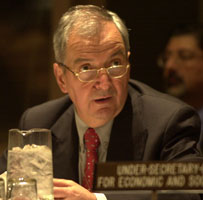
|
 Iran,
on behalf of the G-77/China, underlined UN General Assembly
resolution 59/199 and emphasized that, inter alia: the PrepCom
decides the Summit agenda; CSD-10 should include a draft decision
on the linkages between IEG and the Summit preparatory processes;
the review process be based on a genuine bottom-up approach; Agenda
21 is not up for renegotiation; and that commitments on technology
transfer, capacity building and financial resources should be
fully implemented.
Iran,
on behalf of the G-77/China, underlined UN General Assembly
resolution 59/199 and emphasized that, inter alia: the PrepCom
decides the Summit agenda; CSD-10 should include a draft decision
on the linkages between IEG and the Summit preparatory processes;
the review process be based on a genuine bottom-up approach; Agenda
21 is not up for renegotiation; and that commitments on technology
transfer, capacity building and financial resources should be
fully implemented.
|
|
|
|
 Sweden,
for the EU, emphasized, inter alia, the need for:
a comprehensive review that subsequently addresses challenges that
have arisen since Rio; mobilizing interest at the highest levels
of government; operationalizing sustainable development at different
levels; examining the possibility of a "new deal"; and supporting
regional intergovernmental preparatory meetings.
Sweden,
for the EU, emphasized, inter alia, the need for:
a comprehensive review that subsequently addresses challenges that
have arisen since Rio; mobilizing interest at the highest levels
of government; operationalizing sustainable development at different
levels; examining the possibility of a "new deal"; and supporting
regional intergovernmental preparatory meetings. |

China
noted their ongoing national assessment of sustainable development
and called for poverty eradication, technology transfer and capacity
building.

Canada
suggested engaging civil society to address health & environment;
conservation and stewardship; international environmental governance;
sustainable communities; and innovation and partnership in order
to bring sustainable development within reach of the world's poor.
|
|
|
|

Highlighting the importance of the Barbados Programme of Action,
Samoa,
for the Alliance of Small Island States, underlined
the need to build the capacity of institutions, governments and
community based organizations. Emphasizing the importance of not
going back on the terms negotiated for Agenda 21, he said parties
should nevertheless be prepared to consider new ideas for the next
decade. |
|
Noting
that the Summit is a political process, not a diplomatic negotiation
or a technical seminar, Brazil said the Summit should make
a clear assessment of the successes and failures in implementing
Agenda 21.
|
|
|
|
 Egypt
said resolution 55/199 should provide the sole basis of work, and
proposed that the UN prepare reports on three facets of Agenda 21
implementation to evaluate successes and challenges: trends at the
national level; evaluation of UN system assistance; and contributions
of major groups. He suggested undertaking the regional preparatory
committees before setting the Summit themes and priorities.
Egypt
said resolution 55/199 should provide the sole basis of work, and
proposed that the UN prepare reports on three facets of Agenda 21
implementation to evaluate successes and challenges: trends at the
national level; evaluation of UN system assistance; and contributions
of major groups. He suggested undertaking the regional preparatory
committees before setting the Summit themes and priorities. |
|
On
possible outcomes from the Summit, Iceland cautioned against
producing more long texts on "pet subjects," instead calling for
focus on the themes of fighting poverty, decoupling economic growth
and environmental damage through resource efficiency, and maintaining
the functional integrity of ecosystems.
|
|
|
|
Bolivia
said the Agenda 21 review process should: establish a bottom-up
process that is open to full developing country participation and
is based on UN principles; and, inter alia, consider the themes
of globalization, financial resources, instruments of Agenda 21
implementation and mountainous ecosystems.
|
|
|
 Switzerland
stated that economic, technological and social changes for sustainable
development are only possible through mobilization of all actors
in a strong political alliance, but pointed out that resistance
may occur if it causes significant discomfort in people's lives.
Switzerland
stated that economic, technological and social changes for sustainable
development are only possible through mobilization of all actors
in a strong political alliance, but pointed out that resistance
may occur if it causes significant discomfort in people's lives.
The
Russian Federation outlined national actions toward the 2002
Summit.
|
|

Mauritania
noted that the success of the Summit depends on developing country
input to the preparatory process |
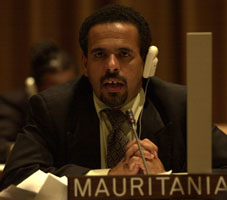
|
|
Draft
Rules of Procedure for the Summit
|
|
Presenting the proposed rules (E/CN.17/2001/PC/24), Director
of the Division for Economic and Social Affairs Joanne DiSano
drew attention to the GA resolution mandating the PrepCom to decide
on the rules of major group participation for the Summit. She noted
that the provisional rules need approval by the GA on the recommendation
of the PrepCom, and recommended that the draft rules of procedure
be considered by this PrepCom with a view to submitting them to
the 56th session of the GA. She suggested that delegates consider
following rule 31 of the GA on the election of a President and Vice-Presidents.
Discussion of this agenda item was deferred until Tuesday morning.
|
|
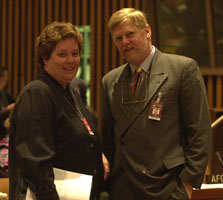 |
Kimo
Goree, ENB Managing Editor, with Rhonda Piggott, Foreign Affairs
and Trade, Australia (left) and Barbara Briglia Tavora, Brazil (right)
|
|
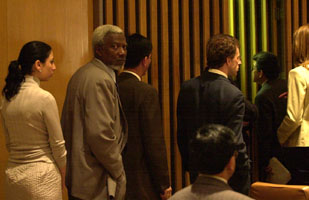 |
Waiting
in line for documents
|
|
Belgium
reads the CSD-9 Summary Report, while Bureau members from Egypt
and Nigeria discuss the Agenda Items
|
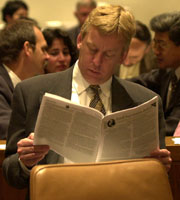 |
|
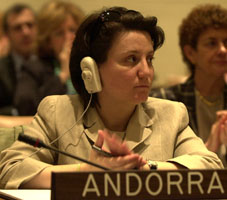 |
Andorra
and Malaysia
|
|
|
Side
Event: Towards a Common Vision: Exploring Links Between the World
Summit on Sustainable Development and Financing for Development
Organized by the International Institute of
Environment and Development (IIED)
|
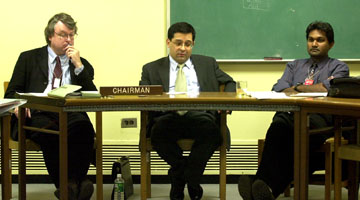 Chaired
by Nigel Cross, Executive Director (left), the International Institute
for Environment and Development (IIED), this side event addressed
the potential linkages between the World Summit for Sustainable Development
and the Financing for Development conferences. Ashok Khosla, Development
Alternatives, India, notes that although finance is at the root of
all discourse on environment and social development, events at Seattle
and Prague illustrate that civil society has agency with which to
force changes in pace. He recognized that massive amounts of resources
flow from the south to the north (through debt repayments, primary
resource transport, low-cost manufacturing, etc.) and that in this
light, the poor are supporting the rich; a perspective which contains
the kernal of revaluing the role of the south in global economic development.
Desighan Naidoo, Head Environmental Planning, Ministry of Environmental
Affairs and Tourism, South Africa (right), described South Africa
as a country of dichotomy, of enduring Chaired
by Nigel Cross, Executive Director (left), the International Institute
for Environment and Development (IIED), this side event addressed
the potential linkages between the World Summit for Sustainable Development
and the Financing for Development conferences. Ashok Khosla, Development
Alternatives, India, notes that although finance is at the root of
all discourse on environment and social development, events at Seattle
and Prague illustrate that civil society has agency with which to
force changes in pace. He recognized that massive amounts of resources
flow from the south to the north (through debt repayments, primary
resource transport, low-cost manufacturing, etc.) and that in this
light, the poor are supporting the rich; a perspective which contains
the kernal of revaluing the role of the south in global economic development.
Desighan Naidoo, Head Environmental Planning, Ministry of Environmental
Affairs and Tourism, South Africa (right), described South Africa
as a country of dichotomy, of enduring
|
|
| Desighan
Naidoo, Ministry of Environmental Affairs and Tourism, South
Africa |
inequality,
sharply dual economies, yet the most developed country in the southern
African region. His revisionist thinking conveyed a need for an African
renaissance with core themes of : investing in Africa's people (peace,
stability, governance systems); development of financial mechanisms
to support growth and resource mobilization; strategic resource management
(minerals, agriculture, biodiversity); and focussed industries (manufacturing,
tourism). He hoped that the 2002 summit would help to form functional
north-south, and south-south relationships, increase literacy in international
environmental and financial discourse, and empower Africa to see itself
through new eyes, recognizing that Africa and all developing countries
are not as disadvantaged as is commonly believed. Mauricio Escanero,
Financing for Development Conference, Mexico (center), noted that
the new process will not only deal with ODA but has an integrated
agenda including mobilizing private capital flows, trade, debt and
systemic issues. The challenge is finding synergies by seeing development
from the point of view of finance, and building political linkages
to make old methods more participatory. |
|
Side
Event: The Treaty Initiative to Share the Genetic Commons
|
|
|
This
initiative aims to establish the Earth's gene pool, in all of its
biological forms and manifestations, as a global commons to be jointly
shared by all peoples. Sponsors are calling for the adoption by
governments and civil society at the World Summit for Sustainable
Development. For more information, contact: treaty@foet.org
Jeremy
Rifkin, Foundation on Economic Trends (FOET)
|
|
|








